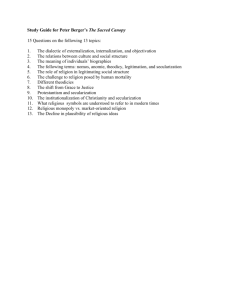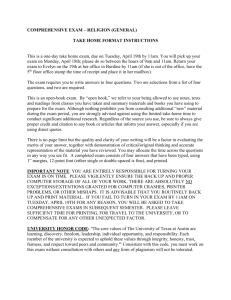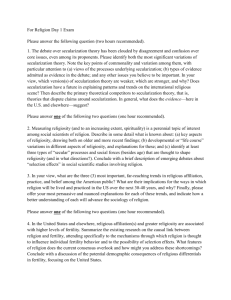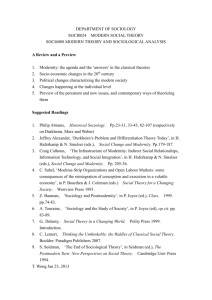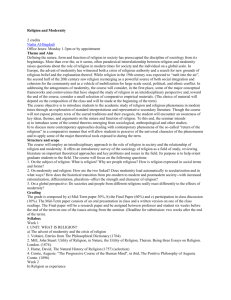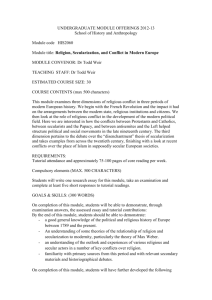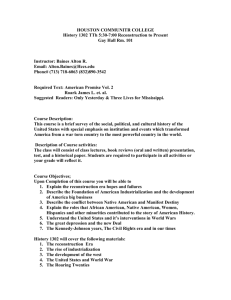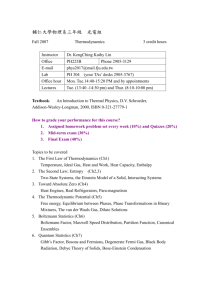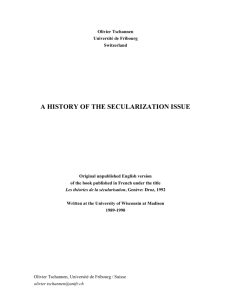Modernity, Secularization, Religious Persistence, Spiritual
advertisement
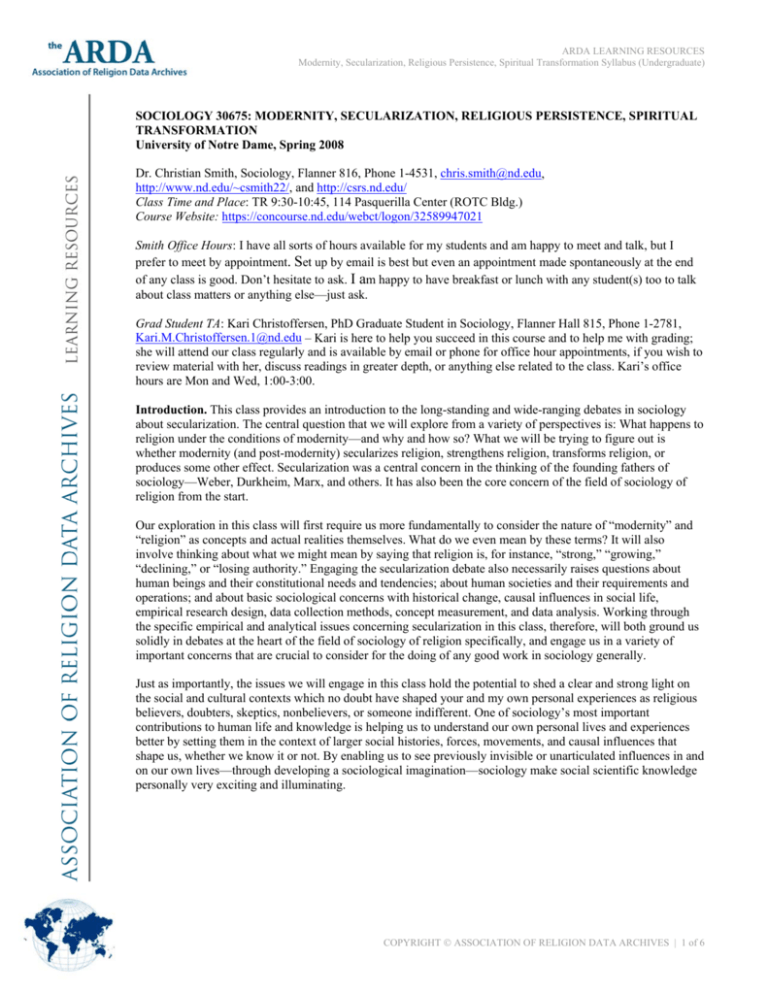
ARDA LEARNING RESOURCES Modernity, Secularization, Religious Persistence, Spiritual Transformation Syllabus (Undergraduate) SOCIOLOGY 30675: MODERNITY, SECULARIZATION, RELIGIOUS PERSISTENCE, SPIRITUAL TRANSFORMATION University of Notre Dame, Spring 2008 Dr. Christian Smith, Sociology, Flanner 816, Phone 1-4531, chris.smith@nd.edu, http://www.nd.edu/~csmith22/, and http://csrs.nd.edu/ Class Time and Place: TR 9:30-10:45, 114 Pasquerilla Center (ROTC Bldg.) Course Website: https://concourse.nd.edu/webct/logon/32589947021 Smith Office Hours: I have all sorts of hours available for my students and am happy to meet and talk, but I prefer to meet by appointment. Set up by email is best but even an appointment made spontaneously at the end of any class is good. Don’t hesitate to ask. I am happy to have breakfast or lunch with any student(s) too to talk about class matters or anything else—just ask. Grad Student TA: Kari Christoffersen, PhD Graduate Student in Sociology, Flanner Hall 815, Phone 1-2781, Kari.M.Christoffersen.1@nd.edu – Kari is here to help you succeed in this course and to help me with grading; she will attend our class regularly and is available by email or phone for office hour appointments, if you wish to review material with her, discuss readings in greater depth, or anything else related to the class. Kari’s office hours are Mon and Wed, 1:00-3:00. Introduction. This class provides an introduction to the long-standing and wide-ranging debates in sociology about secularization. The central question that we will explore from a variety of perspectives is: What happens to religion under the conditions of modernity—and why and how so? What we will be trying to figure out is whether modernity (and post-modernity) secularizes religion, strengthens religion, transforms religion, or produces some other effect. Secularization was a central concern in the thinking of the founding fathers of sociology—Weber, Durkheim, Marx, and others. It has also been the core concern of the field of sociology of religion from the start. Our exploration in this class will first require us more fundamentally to consider the nature of “modernity” and “religion” as concepts and actual realities themselves. What do we even mean by these terms? It will also involve thinking about what we might mean by saying that religion is, for instance, “strong,” “growing,” “declining,” or “losing authority.” Engaging the secularization debate also necessarily raises questions about human beings and their constitutional needs and tendencies; about human societies and their requirements and operations; and about basic sociological concerns with historical change, causal influences in social life, empirical research design, data collection methods, concept measurement, and data analysis. Working through the specific empirical and analytical issues concerning secularization in this class, therefore, will both ground us solidly in debates at the heart of the field of sociology of religion specifically, and engage us in a variety of important concerns that are crucial to consider for the doing of any good work in sociology generally. Just as importantly, the issues we will engage in this class hold the potential to shed a clear and strong light on the social and cultural contexts which no doubt have shaped your and my own personal experiences as religious believers, doubters, skeptics, nonbelievers, or someone indifferent. One of sociology’s most important contributions to human life and knowledge is helping us to understand our own personal lives and experiences better by setting them in the context of larger social histories, forces, movements, and causal influences that shape us, whether we know it or not. By enabling us to see previously invisible or unarticulated influences in and on our own lives—through developing a sociological imagination—sociology make social scientific knowledge personally very exciting and illuminating. COPYRIGHT ASSOCIATION OF RELIGION DATA ARCHIVES | 1 of 6 ARDA LEARNING RESOURCES Modernity, Secularization, Religious Persistence, Spiritual Transformation Syllabus (Undergraduate) Goals. The goals of this course are: To provide students with a thorough knowledge of the scholarly issues, debates, and empirical evidence concerning the issue of secularization and religious persistence and transformation broadly, both as a means to understand the particular issues concerning this class and to learn how to engage other similar, important, broad social science debates To enable students by the end of the semester to have decided their own well-informed view of the fate of religion in modern society To expose students to specific expressions of contemporary religion with which they were not previously familiar To engage students with key pieces of literature that define the secularization debate, in order to increase levels of scholarly expertise in this area To train students to think carefully about key underlying conceptual and methodological issues involved in the sociological examination and testing of knowledge claims about the world To compel students to think about bigger picture questions, such as the meaning of religious strength or faithfulness, the kinds of cultural and social forces that shape people’s religious faith, the nature and impacts of modernity and post-modernity on people’s lives, and so on To provide a broad social backdrop against which students can think reflectively and informatively about the quality and direction of their own religious faith or lack thereof To foster students developing a sociological imagination, to expand our view of the complexity of the world, and to have intellectual fun Requirements. The five requirements of this course are: 1. Regular attendance at and active interaction in class discussions when appropriate. Attendance will be taken (please arrive to the start of class on time). Students with unexcused absences risk having their final grade penalized. Class interactions in discussion do not count formally toward the final grade, although students who contribute well may get a bit of a bump up in the end. 2. 3-page response papers (typed, 1.5 line spacing, Times Roman font, 1-inch margins, stapled) summarizing and engaging/evaluating the assigned reading for the week, due at every Thursday class meeting. Late papers without very good, documented reasons (e.g., very serious illness, death in the family) will not be accepted and will receive 0’s. Papers should briefly summarize the argument(s) of the readings and then respond to the arguments with your own reasoned evaluations, critiques, further questions, creative extensions, etc. Beyond that, there is no specific formula for correctness in this assignment; simply read well, think hard and carefully about what you’ve read, and let that show in your response papers—I want to see that you have read the assigned materials, what you understand of them, and how you respond to and evaluate them. These papers must be well written, use proper grammar and punctuation, and be clean and polished. Poor writing and word choice, errors in punctuation and grammar, messiness, and lack of a staple (paper clipped papers not accepted) will reduce papers’ grades. Altogether, these 15 papers are worth 40% of the final grade. 3. A midterm exam on Tuesday, March 11, the first class meeting after Spring Break, during class time. The midterm exam will cover the reading, lecture, and discussion materials of the first half of the course. The exam will most likely include short-answer and short essay questions. Worth 20% of the final grade. (All students must take the midterm exam at the times scheduled—the only exceptions might be instances of severe illness or family tragedy, in which case the student must contact and make alternative arrangements with the professor before the scheduled exam; do not simply skip the exam, then come afterwards and announce that you could not make the exam, and think you will be allowed to make it up). COPYRIGHT ASSOCIATION OF RELIGION DATA ARCHIVES | 2 of 6 ARDA LEARNING RESOURCES Modernity, Secularization, Religious Persistence, Spiritual Transformation Syllabus (Undergraduate) 4. A final paper (typed, double-spaced, Times Roman font) synthesizing the issues and perspectives engaged in this seminar and explaining your own intellectual perspective on secularization. Students are encouraged to draft out their thoughts as they develop over the course of the semester, rather than waiting to write the paper at the end of the semester. Students may certainly draw upon what they have written in their reading response papers, but the final paper may not simply be a cut-and-paste job cannibalizing those. The final paper needs to entail a well written, coherent, fairly comprehensive argument. The quality of the writing itself as well as proper use of grammar, punctuation, word choice, etc. will count toward the paper’s grade. There is no fixed length that this paper must be. Simply write the best essay expressing your thoughts, being neither too brief nor too rambling. That said, however, I fail to see how the issues to be addressed in this paper can be adequately done so in less than, say, 12 double-spaced pages; 14-18 might be more like it. But do not write toward a given length per se. Due May 7 by 5PM. Worth 20% of the final grade. 5. A final exam, on Wednesday, May 7, 10:30-12:30. The final Exam is not cumulative. The final exam will cover the reading, lecture, and discussion materials of the second half of the course. The exam will most likely include short-answer and short essay questions. Worth 20% of the final grade. (All students must take the final exam at the times scheduled—the only exceptions might be instances of severe illness or family tragedy, in which case the student must contact and make alternative arrangements with the professor before the scheduled exam; do not simply skip the exam, then come afterwards and announce that you could not make the exam, and think you will be allowed to make it up). 6. The professor never offers extra credit assignment options. Final Course Grade Scale A+ (98-100) A (93-97) C+ (78-79) C (73-77) A- (90-92) C- (70-72) B+ (88-89) D+ (68-69) B (83-87) D (60-67) B- (80-82) F (0-59) Academic Integrity. All provisions of the Notre Dame Academic Code of Honor—which prohibits giving or receiving unauthorized assistance on graded course work—will be in effect for all requirements. The Academic Code of Honor includes an understanding that a student’s submitted work must be her or his own. For a complete list of academic expectations, please visit the website at http://www.nd.edu/~hnrcode/IVStudent_Resp.htm. Violations of academic integrity will be reported to the Honesty Committee. Potential Difficulties. If you have any disability or particular issues or challenges that may affect your performance in this course, please let me know as soon as possible and I will make the appropriate arrangements. If in the course of the semester you encounter any emotional or relational or other difficulties that affect your work in this course, please do talk to the professor or the TA for help. Required Readings. The following five books should be available for purchase for this class at the Hammes Bookstore: Bruce, Steve. 2002. God is Dead: Secularization in the West. Blackwell. Davidman, Lynn. 1991. Tradition in a Rootless World: Women Turn to Orthodox Judaism. California. Norris, Pippa and Ronald Inglehart. 2004. Sacred and Secular: Religion and Politics Worldwide. Cambridge. Smith, Christian et al. 1998. American Evangelicalism: Embattled and Thriving. Chicago. Smith, Christian. 2005. Soul Searching: The Religious and Spiritual Lives of American Teenagers. Oxford. We will also read some journal articles and book chapters as listed below, which are available for downloading and printing from the course website—interesting stuff! On average, the readings for this course sum to about 100 pages per week. You must do the assigned readings for each class meeting, beforehand, and come prepared to discuss them. We will not always discuss readings in any given class but students should always come prepared for when we do. COPYRIGHT ASSOCIATION OF RELIGION DATA ARCHIVES | 3 of 6 ARDA LEARNING RESOURCES Modernity, Secularization, Religious Persistence, Spiritual Transformation Syllabus (Undergraduate) Class Meeting and Reading Schedule WEEK 1 – INTRODUCTION TO THE ISSUES TUE JAN 15 First class – review syllabus and begin discussing the issues THURS JAN 17 Bruce, Steve. 2002. God is Dead. New York: Blackwell. Pp. 1-44. WEEK 2 – SECULARIZATION THEORY, RELIGIOUS MEASUREMENT, NEW RELIGIONS TUE JAN 22 Bruce, Steve. 2002. God is Dead. New York: Blackwell. Pp. 45-74. THURS JAN 24 Hadaway, Kirk, Penny Long Marler, and Mark Chaves. 1993. “What the Polls Don’t Show: A Closer Look at U.S. Church Attendance.” American Sociological Review. 58: 741-52. Hunter, James. 1983. “The New Religions: Demodernization and the Protest Against Modernity.” In Bryan Wilson (ed.). The Social Impact of New Religious Movements. Rose of Sharon Press. Pp. 1-19. WEEK 3 – DOUBTS AND RECONSIDERATIONS TUE JAN 29 Berger, Peter L. 1996. “Secularism in Retreat.” The National Interest. (Winter). Davies, Grace. 1990. “Believing Without Belonging.” Social Compass. 37: 456-69. THURS JAN 31 Smith, Christian. 2005. Soul Searching. New York: Oxford. Pp 3-50. WEEK 4 – AMERICAN TEENAGE RELIGION TUE FEB 5 Smith, Christian. 2005. Soul Searching. New York: Oxford. Pp 50-107. THURS FEB 7 Smith, Christian. 2005. Soul Searching. New York: Oxford. Introduction, Chs. Pp 108-171. (Smith in Utah, view Soul Searching movie in class) WEEK 5 – AMERICAN TEENAGE RELIGION TUE FEB 12 Smith, Christian. 2005. Soul Searching. New York: Oxford. Ch. 172-192, 218-233. THURS FEB 14 Smith, Christian. 2005. Soul Searching. New York: Oxford. Ch. 233-264. WEEK 6 – RELIGIOUS PERSISTENCE THROUGH SOLVING PRACTICAL LIFE PROBLEMS TUE FEB 19 Davidman, Lynn. 1991. Tradition in a Rootless World. California. Chs. 1-2. THURS FEB 21 Davidman, Lynn. 1991. Tradition in a Rootless World. California. Chs. 3-4. COPYRIGHT ASSOCIATION OF RELIGION DATA ARCHIVES | 4 of 6 ARDA LEARNING RESOURCES Modernity, Secularization, Religious Persistence, Spiritual Transformation Syllabus (Undergraduate) WEEK 7 – RELIGIOUS PERSISTENCE THROUGH SOLVING PRACTICAL LIFE PROBLEMS TUE FEB 26 Davidman, Lynn. 1991. Tradition in a Rootless World. California. Chs. 5-6. THURS FEB 28 Davidman, Lynn. 1991. Tradition in a Rootless World. California. Chs. 7-8. SPRING BREAK WEEK 8 – MIDTERM EXAM, THEN RELIGIOUS PERSISTENCE THROUGH SUBCULTURAL IDENTITY TUE MARCH 11 MIDTERM EXAM THURS MARCH 13 Smith, Christian et al. 1998. American Evangelicalism: Embattled and Thriving. Chicago. Chs. 1-2. WEEK 9 – RELIGIOUS PERSISTENCE THROUGH SUBCULTURAL IDENTITY TUE MARCH 18 Smith, Christian et al. 1998. American Evangelicalism: Embattled and Thriving. Chicago. Chs. 3-4. THURS MARCH 20 Smith, Christian et al. 1998. American Evangelicalism: Embattled and Thriving. Chicago. Chs. 5-6. WEEK 10 – SECULARIZATION THROUGH MATERIAL WELLBEING TUE MARCH 25 Pippa Norris and Ronald Inglehart. 2004. Sacred and Secular. Cambridge: Cambridge. Pp. 3-52. THURS MARCH 27 Pippa Norris and Ronald Inglehart. 2004. Sacred and Secular. Cambridge: Cambridge. Pp. 53-110. WEEK 11– SECULARIZATION THROUGH MATERIAL WELLBEING TUE APRIL 1 Pippa Norris and Ronald Inglehart. 2004. Sacred and Secular. Cambridge: Cambridge. Pp. 111-155. THURS APRIL 3 Pippa Norris and Ronald Inglehart. 2004. Sacred and Secular. Cambridge: Cambridge. Pp. 215-241. WEEK 12 – MORE SECULARIZATION THEORY TUE APRIL 8 Bruce, Steve. 2002. God is Dead. New York: Blackwell. Pp. 106-116, 186-203. THURS APRIL 10 Bruce, Steve. 2002. God is Dead. New York: Blackwell. Pp. 204-228. WEEK 13 – SPIRITUAL TRANSFORMATIONS, CIVIL RELIGION TUE APRIL 15 Wuthnow, Robert. 1998. After Heaven: Spirituality in America Since the 1950s. Berkeley: California. Pp. 1-84. THURS APRIL 17 Bellah, Robert. 1967. “Civil Religion in America.” Daedalus. 96 (Winter). Pp. 1-21. COPYRIGHT ASSOCIATION OF RELIGION DATA ARCHIVES | 5 of 6 ARDA LEARNING RESOURCES Modernity, Secularization, Religious Persistence, Spiritual Transformation Syllabus (Undergraduate) WEEK 14 – “INTERNAL SECULARIZATION” OR CREATIVE DEVELOPMENT? TUE APRIL 22 McNamara, Patrick. 1992. Conscience First, Tradition Second. SUNY Press. Pp. 1-47. Smith, Christian. 2005. Soul Searching. New York: Oxford. Pp 193-217. THURS APRIL 24 Ammerman, Nancy. 1997. “Golden Rule Christianity,” pp. 196-216 in David Hall (ed.), Lived Religion in America. Princeton. Gallagher, Sally K. and Christian Smith. 1999. “Symbolic Traditionalism and Pragmatic Egalitarianism.” Gender and Society. 13(2): 211-233. WEEK 15 – MULTIPLE MODERNITIES? TUE APRIL 29 Eisenstadt, S.E. 2000. “Multiple Modernities.” Daedalus. Winter, 129(1): 1-29. Final Exam: Wed, May 7, 10:30-12:30 COPYRIGHT ASSOCIATION OF RELIGION DATA ARCHIVES | 6 of 6
